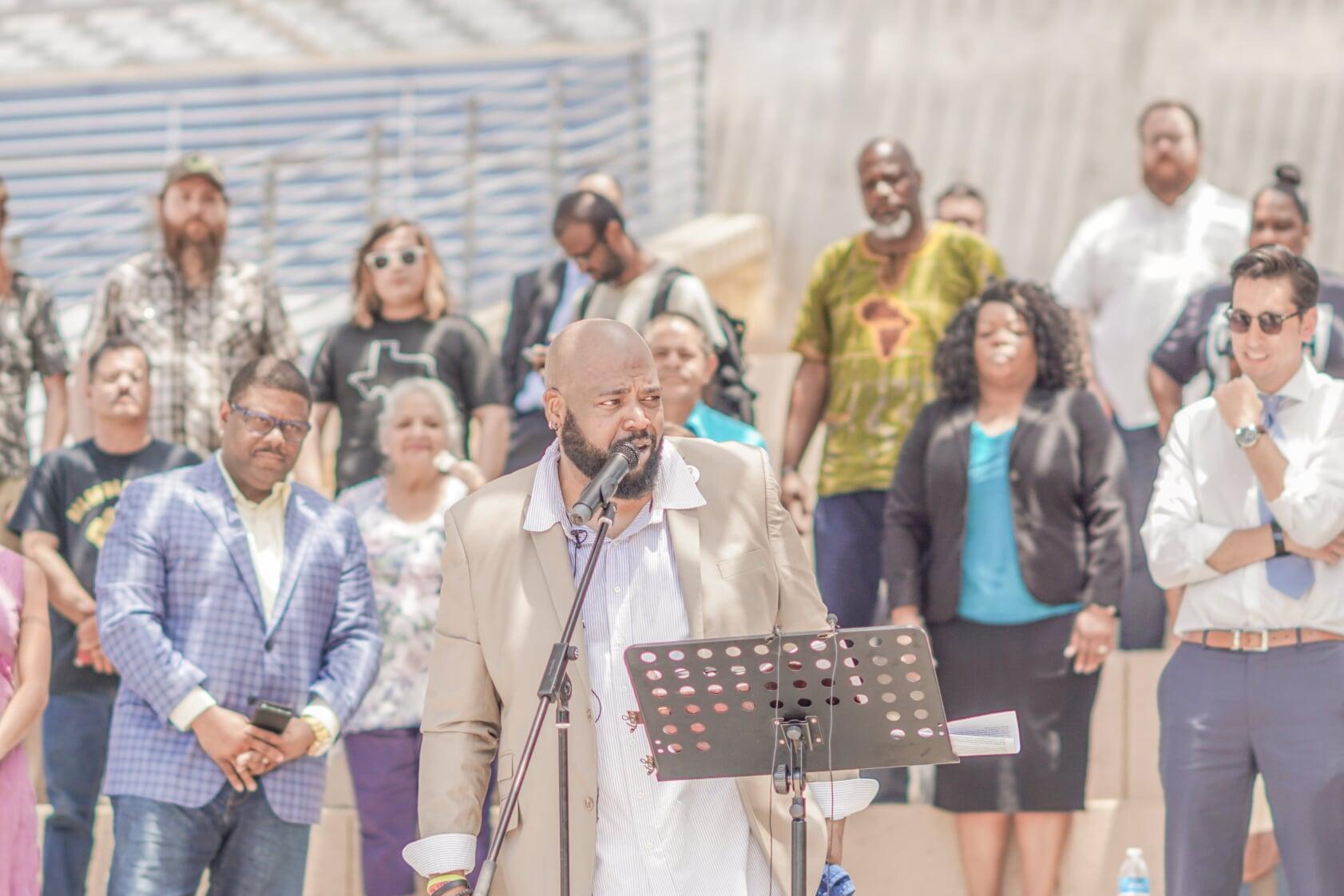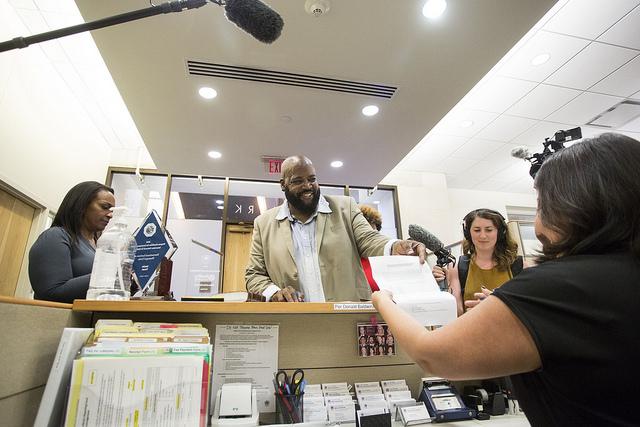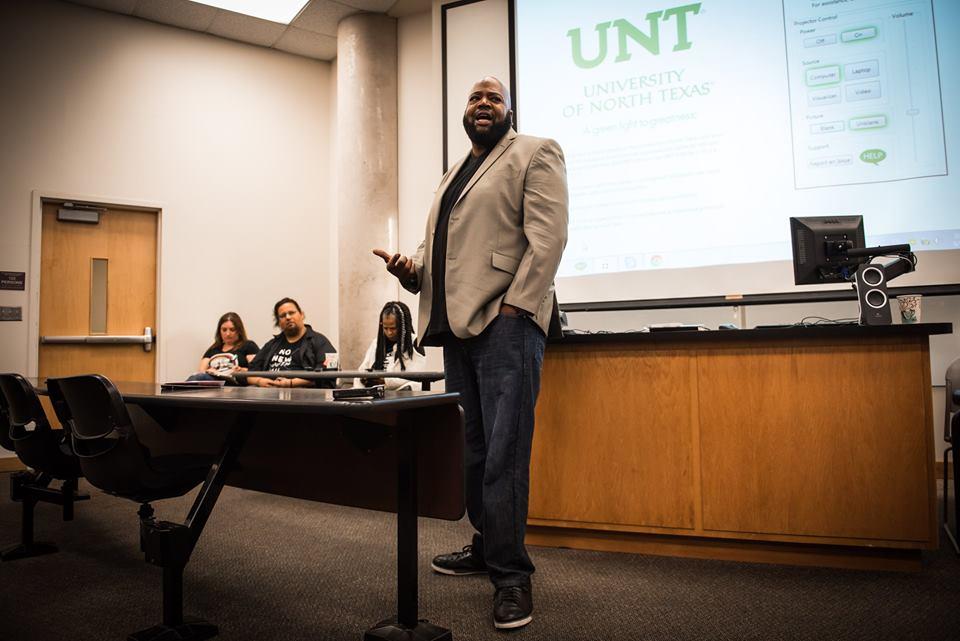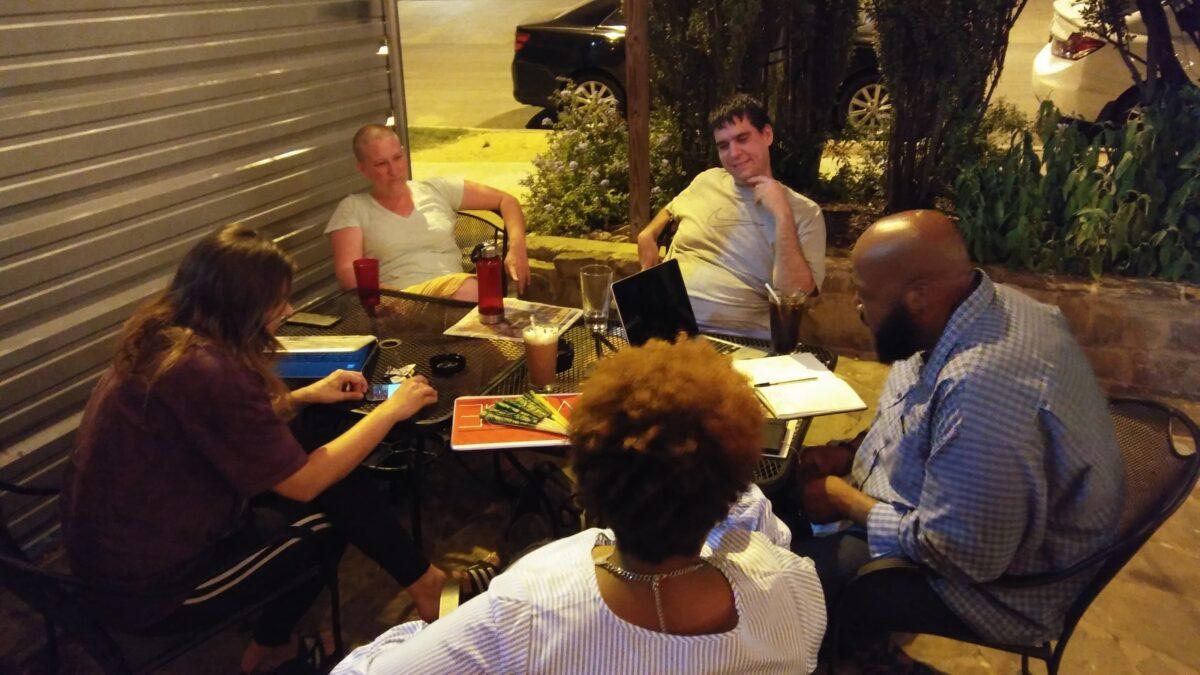‘We thought it was important to knock down doors’
Lewis Conway Jr., a formerly incarcerated activist running for Austin City Council, sits down with The Appeal.

For Lewis Conway Jr., deciding to run for office was the easy part. The Austin native was a community activist looking for another way to make change. But until mid-August, the fate of his candidacy for City Council was uncertain. He had served eight years in prison and 12 on parole, and although his voting rights were restored, city officials questioned his eligibility. Only this month was he officially cleared for the November ballot.
Conway is chestnut-hued, husky, and 6 feet 6 inches tall. You can’t miss him. Yet, years before he entered the spotlight, he says, he felt like a “walking ghost.”
When he returned home from prison, he explains, his family and community didn’t “know how to deal with somebody they had a funeral for.” Now, years after settling into his purpose, he feels like he’s back from the dead and eager to connect with voters. “I don’t have time to make you feel good,” he said. “I got time to make you feel me.”
Conway, who is married and has three children, isn’t afraid to talk about his past. In 1992, he was convicted of voluntary manslaughter after he stabbed a man during a fight over drugs he said the man had stolen from him. Conway said it was self-defense. Politics were foreign terrain when he was released from prison in 2000, he says, and running for office definitely wasn’t part of his parole plan.
He did, however, want to find a job, but says it felt impossible to find one. “I realized that I was society’s worse perceived nightmare. I was a big, Black man that had been convicted of a violent crime, expecting to be treated normal.” Denied too many jobs to count, he created his own, working as a DJ, music and video director, and author. Ultimately, he made his way into community organizing. In 2016, as political director of the Second Chance Democrats, he helped pass Austin’s Fair Chance Hiring ordinance, which prohibits most employers from asking about or considering a job applicant’s criminal background before making an offer.
The first time someone suggested he run for office, Conway, a self-described democratic socialist, was skeptical. “I’m an organizer,” he remembers thinking. “I fight politicians.” Still, in 2017, he decided to join the race to replace departing incumbent City Council member Ora Houston. He quickly learned that according to Texas election code, a convicted felon cannot run for office unless he or she has been pardoned or “released from the resulting disabilities” of the conviction.
Although Conway’s campaign was slowed by the indecision over whether he could run, the Working Families Party endorsed him in early August. He also hopes to secure the endorsement of the Democratic Socialists of America.
Conway recently spoke with The Appeal about criminal justice reform, disenfranchisement, and being radical about change.
This interview has been lightly edited for length and clarity.
The Appeal: There were a lot of questions about whether you were legally allowed to run.
Conway: The language is purposefully ambiguous to give the impression that someone can’t run.
When I saw it as part of the election code, I was like, “That’s crazy, that’s crazy. I’m not falling for that. I’m not.” And so, I don’t see anything here that says my disabilities aren’t resolved. As a matter of fact, what disability are you talking about? Are you talking about the fact that I can’t get housing? That I can’t get employment? Are you talking about the fact that I go into a place of business and I’m automatically stared at?
The Constitution said I could run for Congress, the Constitution said I could run for president, the Constitution said I could run for Senate.
You got to be crazy as hell to tell me I can’t run for City Council.

You’re part of a wave of democratic socialists running for office nationwide, including Cynthia Nixon and Alexandria Ocasio-Cortez. What does that affiliation mean to you?
What it means to me is democratically deciding how our budget is disseminated. Democratically deciding how our community receives services and what monies are being spent to provide those services. Democratically determining, in the community, what participatory democracy looks like.
I think too often leadership from elected officials has been top-down as opposed to bottom-up. And so, we started our campaign with a people’s assembly where we made ourselves available to folks and we wanted to hear what people had to say about their conditions. Because we believe people are experts in their own conditions.
When I began this race, even though it was a nonpartisan race, Austin is a partisan town. The state is Republican but Austin is Democrat. And I have seen what the Democrats have done to Black folks over the last 45 years of my life in Austin, so I wasn’t comfortable calling myself a Democrat.
So, coming into it, I was familiar with Black Marxism, I was familiar with Chokwe [Antar] Lumumba’s campaign in Jackson, Mississippi. And Lumumba’s campaign about [trying to make Jackson] the most radical city on the planet is what I built my campaign after. So, I knew that socialism was going to be the only way that I was going to get the kind of ideas that Black folks needed to embrace in order for us to realize the best conditions in our lives.
You have a lot of work to do on that front. I’ve read, for instance, that Black people in Austin are seven times more likely to be arrested for low-level marijuana arrests than their white counterparts. Is that something you’d tackle in office?
Absolutely. We [Grassroots Leadership] were the organization that led on the “Freedom City” Resolutions. … In 2015, we put out a Travis County racist-jailing report that showed … Black folks are being arrested at a higher rate and were being jailed for a longer time period than white people are.
So, even with the juvenile curfew, the juvenile curfew was one of the ordinances that the incumbent voted to keep in place [though she later reversed her stance]. And that juvenile curfew, of course, targeted brown and Black kids in parts of town that are historically populated by people of color. And so, the school-to-[prison] pipeline process in Austin is well-entrenched in our public schools. And it’s definitely well-entrenched in the policy that governs how elected officials interact.
You mentioned the Freedom City resolutions. Those restrict police questioning of immigrants and aim to cut down on nonviolent arrests, which tend to disproportionately affect Black and Latinx residents. How much will they help?
There’s always a lot of political will spent in passing these types of ordinances, but there’s little political will spent on the implementations. I think it’s important for us to realize they are just resolutions; they are not policy or best practices. And we need to really be adamant about making sure that the stakeholders who are involved in this process, that we are working closely with law enforcement and making sure we’re giving folks alternatives besides arrest and incarceration.

Supporters say you’ve served your time for the offense, while some, including the mother of the man you killed, argue that you don’t deserve this opportunity. How do you plan to earn the trust of your constituents?
As an organizer, we practice transformational justice. And that means that’s a two-way street. That means I have to hold a space for people to feel how they feel. And I have to hold a space for people that I have harmed to hold me accountable.
So, when the victim’s mother came out and said what she said, I didn’t do a public apology. I reached out to her pastor, I reached out to the reporter, and I opened up a space for her to hold me accountable. Not for me to apologize, but for her to hold me accountable.
Just like it’s an opportunity for me to advance the cause for more than 4 million Texans with criminal justice involvement. It’s also an opportunity for us as a community to advance the cause of healing.
I don’t ask for any special consideration. I ask the people to judge me based upon my merit. What have I done at City Hall? What have I done at the State Capitol? What have I done on behalf of people who have backgrounds [in the criminal justice system], for people who’ve been in mental health institutions, right?
So, I think that’s a fair question, and my immediate response is, you know, “When do we allow people the space not to be the same person that they were 27 years ago?”
As of July 15 campaign finance filings, you’d raised less in campaign donations than your opponents. Why do you think that is and how important is it?
I couldn’t raise the money because there was this cloud of doubt of if I would even be eligible to run. From July to July, it has been a question about if I can run or not. They wait for the last day of filing to say, “OK, he’s officially on the ballot, right.” I announced my candidacy December 4, 2017. So, for nine months I’ve been having to campaign, and the first question people ask me is, “Are they going to let you run?”
So, that has been the tenor and the tone of the coverage and our campaign. This is the first time we’re actually able to campaign without the miasma of doubt hanging over our heads.
The people who have donated to our campaign up to this point really believed in us, really believed in the power of transformation, really believe in the power of another chance. I don’t like to use that second-chance language because some folks need a third and fourth chance. We need another chance.
Austin is a gentrifying city and I’ve heard your campaign volunteers are racially diverse. How are you mobilizing different types of people?
There are more white people [than Black people] in Black Lives Matter T-shirts in Austin. … Some Black folks look at civil rights issues in Austin like the status quo, like, this is how it’s always been. Many have been conditioned in Austin since the 1928 master plan, [which segregated the city] almost a hundred years ago, that politics wasn’t and isn’t a significant factor in our lives as Black folk. The reason why I have a coalition of white folks going to doors for me is because the establishment Black folks won’t embrace me, have not embraced me.
Black college kids love me, the white college kids love me, the white old ladies love me. … We have built a multicultural coalition … made up of folks who have fought for criminal justice, who are directly impacted by criminal justice. But also honestly believe that they want a change in their leadership and they believe in diversity in leadership.

We’re seeing various forms of activism around criminal justice, most recently the nationwide prison strike. What do you think are the most crucial steps to dismantling mass incarceration and the prison industrial complex?
The top thing that we have to do is rescind the 13th Amendment. The 13th Amendment, of course, as we know, allows for the enslavement of folks who are incarcerated. For me, as an abolitionist, it goes beyond free slave labor. It speaks to everything that encompasses the definition of slave: loss of identity, no human or civil rights.
When we look at the way our economy is built upon law enforcement, you know, we’ve got local police, we got school police, we got state police, we got federal police, we got secret police, we got secret police that watch the secret police. We got judges, we got lawyers, we got courtrooms, we got prisons. So, our whole economy is built on a law enforcement modality.
In order for us to address the criminal justice system, we have to rethink our business model.
Addressing mass incarceration is going to require us to address re-entry, is going to require us to address alternatives to incarceration, it’s going to require us to address housing, employment. And then there’s the whole sentencing component, right. We have to address federal sentencing laws, we have to address local sentencing laws, stop keeping people in jail because they can’t pay bond.
The prison industrial complex, you have to kind of see it like the music industry before CDs came in, when we still had albums. You had people that pressed up the albums, you had people who recorded the albums, you had people that shipped the albums, you had people that made the album covers. See, there was a whole industry of putting out a piece of music. Well, there’s a whole industry around disenfranchisement of a person. Until you look at it like an industry, as opposed to these single pieces, we’re going to always be having this conversation of mass incarceration.
Any fears in taking on this race?
My only fear is the impact on [two of] my children, you know. There’s a lot of stuff they were too young to know about and now it’s starting to come out in the press. I think that’s my only fear, that they find out I gave up custody and don’t know why.
There have been some vague allegations floated against you regarding that child custody dispute with your ex-girlfriend. What can you tell us about that?
A decade ago, I was involved in an ugly court battle, like Austin court battles get, and some untrue allegations were made that were false then and are false now. And those allegations were devastating to my family, the relationship with my children. And for me, it’s about all of the other fathers that may not have the same platform to defend themselves.
How hopeful are you about your chances of winning?
Not only are we going to win, but we counted wins along the way. … We felt like it was important to change the narrative, and count that as a win. We thought it was important to knock down doors, we thought that was a win. But most of all, we feel that if the people of Austin elect someone with our background, that is not only a win for District 1, it’s a win for Austin, and it’s a win for Texas and ultimately that translates into a win for America.
